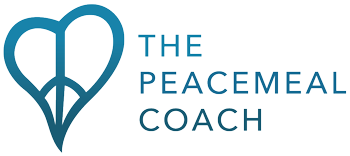To find peace when your teen has anorexia sounds like an impossible goal to most moms. But learning to find peace is vital if we want to support our teens to recovery. Finding peace is part of caring for ourselves which isn’t easy when we are caring for our anorexic teens. Luckily, it is possible to find peace when your teen has anorexia by following 5 steps.
When your days are filled with making and serving meals to someone who refuses to eat, but whose life depends on it, it can feel like you will never experience peace again. With your anorexic teen crying, refusing to eat, dumping plates of food on the kitchen floor, accusing you of wanting to make her fat, harming herself, or threatening suicide all day and into the night, how can a mom consider peace as a possibility?
It is a time consuming and emotionally demanding responsibility to care for an anorexic child. Recovery doesn’t happen overnight. It can take years. But, anorexia does not have to control your life.
It is possible that even when your daughter’s anorexic behavior is at its worst, you can create inner peace and calm.
I’m not saying that the goal is to be at peace with your daughter having anorexia. Watching her go through the misery and destruction of an eating disorder, your natural inclination will be to stay in thoughts that create the opposite of peace. Staying in the turmoil that is anorexia is what your brain will want you to do.
But, caring for yourself by learning to find peace that is not dependent on your daughter’s behavior puts you in a better position to care for her. That is why it is well worth your time and effort to invest in learning how to make peace for yourself.
You can create peace at any time by following these 5 steps:
1. Give yourself credit for everything you’ve done to get to where you are in your daughter’s recovery.
Literally give yourself a pat on the back, a standing ovation, applause, a high five, and/or a hug. Allow yourself to celebrate what you have accomplished.
Whether you have gotten your daughter the in-patient care she needs, started looking at residential treatment centers, or decided to feed her at home, stop and appreciate the work you have done to help your daughter. Regardless of how far along you are on the road to recovery, every action you have taken, every bit of information you have gathered, every failed attempt to get her to eat, every encouraging word you’ve given her, every day you have kept going when you didn’t know if you had the strength, is progress. Acknowledge yourself for a job well done.
2. Look for things to like about yourself.
3. Pay gentle attention to your thoughts throughout the day.
Once you become aware of the unconscious thoughts that you are automatically thinking, you can learn to consciously choose thoughts that bring you peace.
4. Be understanding with yourself.
5. Accept reality and work with it, not against it.
Acceptance of your daughter’s anorexia does not mean that you become helpless, or that you stop taking action. It means that you acknowledge where you are today, and you decide what adjustments need to be made to move forward.
Check in with yourself. What is going on with you? By being interested in what you are thinking and suspending judgment about your thoughts, you will be able to identify beliefs that could be getting in your way. If you notice that old belief systems are interfering with your ability to take care of yourself while you are taking care of your daughter, you can then work to acknowledge your feelings without letting them control your behavior.
- Do you believe it’s selfish for you to want to feel peaceful because your teen isn’t able to feel peaceful right now?
- Are you thinking that you could have or should have done something to keep this from happening to your child?
- Do you believe you are causing your teen pain by requiring her to eat and not allowing her to exercise?
- Is your belief about anorexia that it is a bad thing, and bad things aren’t supposed to happen to good people?
Choose Peace
Are your beliefs useful to you, or are they outdated or erroneous? Identifying beliefs that are not useful to you, is the starting point for the creation of new beliefs. By practicing the 5 Steps to Find Peace When Your Teen Has Anorexia, you are taking care of yourself. When you take care of yourself, you can be the confident, calm, and compassionate parent you want to be.
Supporting your teen’s anorexia recovery may be one of the hardest things you will ever do. Remember when your brain wants you to be in turmoil, you can choose peace. Anytime you doubt yourself or your ability to manage what is happening, peace is available to you.
I would love to help you learn to find peace while you are caring for your anorexic teen. Email me at jenni@peacemealcoach.com to schedule a free consultation.






